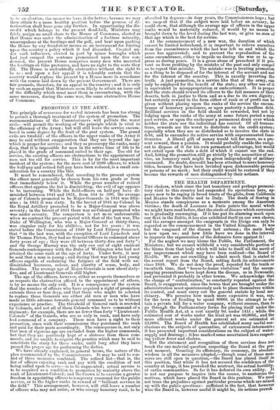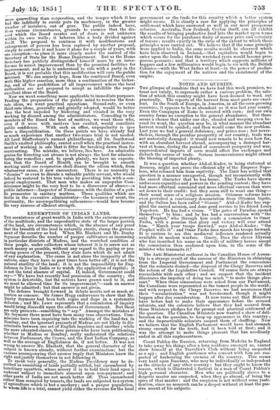THE HEALTH DEPARTMENT.
THE cholera, which since the last transitory and perhaps premoni- tory visit to this country had suspended its operations here ap- pears now to be raging in broad tracts of the globe, from California' and Mexico to the Baltic and to Italy. The death of Sontag in Mexico stands conspicuous as a memento among the American victims ; the death of Lascases in Paris points the moral which we might have read before, that the circle of disease which surrounds us is gradually converging. If it has put its alarming mark upon our fleet in the Baltic, it has also exhibited itself on our own shores; and the ravages amongst the emigrants in the Dingo Can only be regarded as the commencement in the United Kingdom. It was but the vanguard of the disease last autumn ; the main body is now upon us ; and how little have we done in the interval- to improve the organization of the defensive force against it! For the neglect we may blame the Public, the Parliament, the Ministers ; but we cannot withhold a very considerable portion of the blame from that body which will take to itself all the merit of- any improvement which may have been realized—the Board of Health. We are not unwilling to admit much that is stated in the recent report from the Board, setting forth its achievements since 1818. We do not deny the proof, repeated for the tenth or twentieth time, that "house-to-house visitation" and the ROOM- panying precautions have kept down the disease, as in Nevrcastie, and prevented it probably in other towns. We acknowledge that the charge of "centralization," so constantly repeated against the Board, is exaggerated, since the towns that are brought under the administration must spontaneously seek to place themselves within its control, and must carry out the general statute by local ma- chinery. We perceive how mach more expensive it was, say, for the town of Reading to spend 80001. in the attempt to ob- tain a private bill for a water company, without success, than to go through the Parliamentary forms for placing itself under the Public Health Act, at a cost exactly M. under 1411. ; while the estimated cost of works under the local act was 60,000/., and the more efficient works under the general act are estimated at 25,0001. The Board of Health has established many useful con- clusions on the subjects of quarantine, of extramural interments; it has presented important considerations on the subject of water supply and drainage ; it has marked some ascertained laws respect- ing yellow fever and cholera.
But the statement and recognition of these services does not touch the one material question respecting the Board at the pre- sent moment. Granting its efficiency, its economy, its absolute wisdom in all the measures adopted,—though some of those mea- sures are still open to question,—the Board has placed itself in this position, that while it has not secured the confidence of the country at large, it has provoked the mistrust, the actual hostility, of entire communities. So far it has defeated its own utility. It is not our purpose to inquire into the causes, to anatomize the motives, which have placed the Board in this poaitien: We need not trace the prejudices against particular persons which are mixed up with the public questions: sufficient is the fact, that however wise the Board is, however useful it might be, its actions provok
more quarrelling than ceiirieratien, and the temper which it has had the infelicity to excite puts its machinery, in the greater number of instances, out of gear. The public indeed have, from various circumstances, grounds to surmise that the dis- cord which the Board creates out of doors is not unknown within its own walls ; it behaves like a body divided against itself. The proposal to continue it with modifications and enlargement of powers has been replaced by another proposal, simply to continue it and leave it alone for a couple of years, with one exception—to place it more closely under the control of the Secretary, of State for the Home Department. But as the Home Secretary has publicly distinguished himself more by an inter- ference td 'arrest improvement than by the promised facilities for Miprovetnent, and as he is understood to side with a party in the Board, it is not probable that this modification will cure the public mistrust. We can scarcely hope, from the continued Board, even with this higher sanction, more than a continuation of the bicker- ing-, and of the prohibition of all improvement where the local authorities are not prepared to accept as infallible the super- excellent ideas of the Board.
Now we want something more applicable to immediate purposes. Pending the preparation of the public mind to receive the first- rate ideas, we want practical operations. Second-rate, or even third-rate ideas, generally and genially adopted, would be better ban the best impeded by bickering and vitiated in the very working by discord among the administrators. Conceding to the ' members of the Board the best of motives, we want those who, even if it were with motives less exalted, would conciliate public confidence. With such an office, unpopularity is ipso facto a disqualification. On these points we have already had so much experience that another two-years trial is not needed. All Lord Shaftesbury's earnest philanthropy, all Dr. Southwood Smith's exalted philosophy, cannot avail when the practical instru- ment of working is one that is fitter for breaking down than for constructing. The mistake, we believe, lies here. An admirable genius for ferreting out abuses is not always the best for adminis- tering the remedies ; and, to speak plainly, we have no expecta- tion that the Board of Health can be brought to smooth working until one resignation shall disarm the odium which, from whatsoever cause, it now encounters. There is no necessity to "dismiss" or even to disrate a valuable public servant, who would indeed be restored to his true value by providing him with a con- genial employment. That man who makes an unpopular Com- missioner might be the very best to be a discoverer of abuses—a public informer—Inspector of Nuisances, with the duties of a pub- lic prosecutor in sanitary matters. Those qualities which are faults in the executive administrator—the keenness of scent, the pertinacity, the unsympathizing callousness—would here become the very sources of efficient strength.



























 Previous page
Previous page